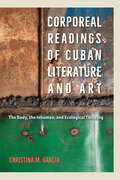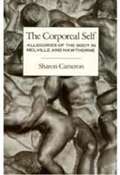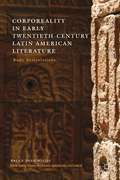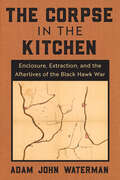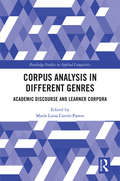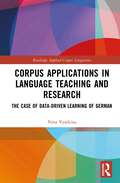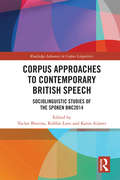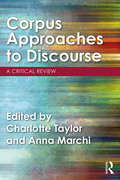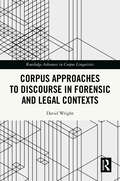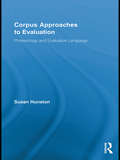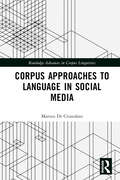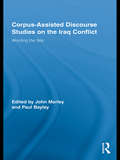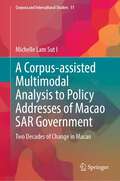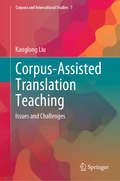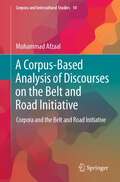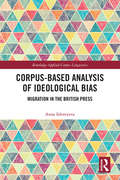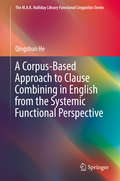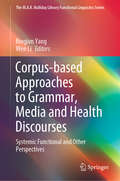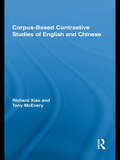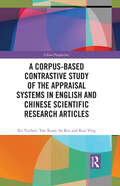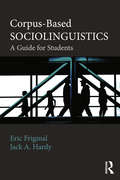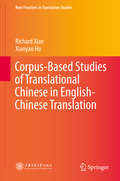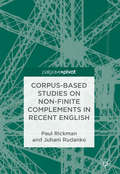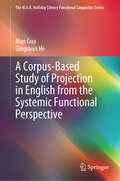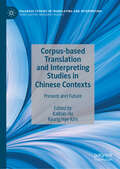- Table View
- List View
Corporeal Readings of Cuban Literature and Art: The Body, the Inhuman, and Ecological Thinking
by Christina M. GarcíaTracing corporeality and materiality across Cuban texts and images of the twentieth century This volume looks at Cuban literature and art that challenge traditional assumptions about the body. Examining how writers and artists have depicted racial, gender, and species differences throughout the past century, Christina García identifies historical continuities in the way they have emphasized the shared materiality of bodies. García shows how these works interact with ecologies of the human and nonhuman across diverse media, time periods, and ideologies. García examines corporeality in a variety of works, including the poetry of Nicolás Guillén and experimental writings of Severo Sarduy; transspecies drawings, paintings, and sculptures by Roberto Fabelo; Tomás Gutiérrez Alea’s popular queer film Fresa y chocolate; and contemporary narrative fictions by Ena Lucía Portela, Antonio José Ponte, and Ahmel Echevarría. Using the lenses of new materialism, critical race studies, critical animal studies, queer studies, and poststructuralism, García engages with Cuban cultural production at the intersection of diverse social issues. In this book, García explores how certain artistic practices focus on portraying ecological relationships instead of recognizable subjects or shared identity. Corporeal Readings of Cuban Literature and Art demonstrates that through their attention to the connections that different kinds of bodies share, Cuban creators have long undermined rules of classification and unification, reimagining community as shared vulnerability and difference. Publication of this work made possible by a Sustaining the Humanities through the American Rescue Plan grant from the National Endowment for the Humanities.
The Corporeal Self: Allegories of the Body in Melville and Hawthorne (Morningside Book)
by Sharon CameronThe Corporeal Self argues that questions about identity, conceived in bodily terms, are not only relevant for Melville and Hawthorne, the two nineteenth-century authors whose works are positioned at opposite extremes of the consideration of human identity, but lie at the heart of the American literary tradition, and have, in that tradition, their own revisionary status.
Corporeality in Early Twentieth-Century Latin American Literature
by Bruce Dean WillisFeaturing canonical Spanish American and Brazilian texts of the 1920s and 30s, Corporeality in Early Twentieth-Century Latin American Literature is an innovative analysis of the body as site of inscription for avant-garde objectives such as originality, subjectivity, and subversion.
The Corpse in the Kitchen: Enclosure, Extraction, and the Afterlives of the Black Hawk War
by Adam John WatermanReassessing the archive of the Black Hawk War, The Corpse in the Kitchen explores relationships between the enclosure of Indigenous land, histories of resource extraction, and the literary culture of settler colonialism. While conventional histories of the Black Hawk War have long treated the conflict as gratuitous, Adam John Waterman argues that the war part of a struggle over the dispensation of mineral resources specifically, mineral lead—and the emergence of new cultures of killing and composition. The elemental basis for the fabrication of bullets, lead drawn from the mines of the upper Mississippi, contributed to the dispossession of Indigenous peoples through the consolidation of U.S. control over a vital military resource. Rendered as metallic type, Mississippian lead contributed to the expansion of print culture, providing the occasion for literary justifications of settler violence, and promulgating the fiction of Indigenous disappearance.Treating the theft and excarnation of Black Hawk’s corpse as coextensive with processes of mineral extraction, Waterman explores ecologies of racial capitalism as forms of inscription, documentary traces written into the land. Reading the terrestrial in relation to more conventional literary forms, he explores the settler fetishization of Black Hawk’s body, drawing out homoerotic longings that suffuse representations of the man and his comrades. Moving from print to agriculture as modes of inscription, Waterman looks to the role of commodity agriculture in composing a history of settler rapine, including literal and metaphoric legacies of anthropophagy. Traversing mouth and stomach, he concludes by contrasting forms of settler medicine with Black Hawk’s account of medicine as an embodied practice, understood in relation to accounts of dreaming and mourning, processes that are unforgivably slow and that allow time for the imagination of other futures, other ways of being.
Corpus Analysis in Academic Discourse: Academic Discourse and Learner Corpora (Routledge Studies in Applied Linguistics)
by María Luisa Carrió-PastorThis collection sheds light on the ways in which corpus linguistics and the use of learner corpora might be applied to the study of academic discourse, revealing linguistic and rhetorical patterns and insights into variation across a range of disciplinary genres. Organized into three sections, the book highlights key tools and methodologies in corpus analysis to study such features as discourse markers, lexical bundles, linguistic complexity, lexico-grammatical conventions, and modality in case studies in studies of academic discourse, both in a second language and in English for specific purposes. The volume features examples from disciplinary genres not often covered in the existing literature, including MA theses, academic book reviews, and online student forums. Taken together with the study of learner corpora, the book demonstrates the impact of corpus linguistic tools in better understanding linguistic patterns of specific languages and language use and in turn, their role in helping to identify the needs of language learners. The book will be of interest to students and scholars in corpus linguistics, applied linguistics, and English for Specific Purposes.
Corpus Applications in Language Teaching and Research: The Case of Data-Driven Learning of German (Routledge Applied Corpus Linguistics)
by Nina VyatkinaCorpus Applications in Language Teaching and Research: The Case of Data-Driven Learning of German provides a historical overview of corpus applications in language teaching with a focus on German. The book identifies challenges in using corpus applications and data-driven learning (DDL) research for Languages Other Than English (LOTEs) and addresses these challenges through various approaches. Overall, this book: surveys corpus applications for teaching and learning German, highlighting the growth of the L2 German DDL field and identifying trends in integrating DDL into pedagogical practice; presents empirical research on the effectiveness of DDL applications for teaching and learning German in comparison with research on English and other LOTEs, emphasizing the need for expanding the scope of DDL research to include more languages, skills, and study types; compares teaching interventions for L2 collocations in the fields of Instructed Second Language Acquisition (ISLA) and DDL, highlighting methodological differences between the two paradigms and proposing a combined ISLA/DDL framework to bridge the disconnect; showcases a successful DDL intervention that resulted in significant learning gains in German collocation knowledge, filling a gap in DDL research; proposes an Open Educational Resource (OER) for teaching and learning German, incorporating open access corpora, learner-fit criteria, new tools and technology, and usage-based learning principles; examines the current difficulties encountered by the DDL field and highlights potential directions for future research and pedagogical approaches. This book offers insights and resources for researchers, language teaching practitioners, and students interested in corpus-based learning and teaching methods. While the focus is on teaching German to English-speaking students, the book's findings have broader applicability to language teaching and learning in different contexts.
Corpus Approaches to Contemporary British Speech: Sociolinguistic Studies of the Spoken BNC2014 (Routledge Advances in Corpus Linguistics)
by Vaclav Brezina Robbie Love Karin AijmerFeaturing contributions from an international team of leading and up-and-coming scholars, this innovative volume provides a comprehensive sociolinguistic picture of current spoken British English based on the Spoken BNC2014, a brand new corpus of British speech. The book begins with short introductions highlighting the state-of-the-art in three major areas of corpus-based sociolinguistics, while the remaining chapters feature rigorous analysis of the research outcomes of the project grounded in Spoken BNC2014 data samples, highlighting English used in everyday situations in the UK, with brief summaries reflecting on the sociolinguistic implications of this research included at the end of each chapter. This unique and robust dataset allows this team of researchers the unique opportunity to focus on speaker characteristics such as gender, age, dialect and socio-economic status, to examine a range of sociolinguistic dimensions, including grammar, pragmatics, and discourse, and to reflect on the major changes that have occurred in British society since the last corpus was compiled in the 1990s. This dynamic new contribution to the burgeoning field of corpus-based sociolinguistics is key reading for students and scholars in sociolinguistics, corpus linguistics, pragmatics, grammar, and British English.
Corpus Approaches to Discourse: A Critical Review
by Charlotte Taylor Anna MarchiCorpus linguistics has now come of age and Corpus Approaches to Discourse equips students with the means to question, defend and refine the methodology. Looking at corpus linguistics in discourse research from a critical perspective, this volume is a call for greater reflexivity in the field. The chapters, each written by leading authorities, contain an overview of an emerging area and a case-study, presenting practical advice alongside theoretical reflection. Carefully structured with an introduction by the editors and a conclusion by leading researcher, Paul Baker, this is key reading for advanced students and researchers of corpus linguistics and discourse analysis.
Corpus Approaches to Discourse in Forensic and Legal Contexts (Routledge Advances in Corpus Linguistics)
by David WrightThis book is the first of its kind to bridge the gap between corpus linguistics and forensic linguistics, illustrating the value of applying corpus linguistic data, tools, and methods in the analysis of language in the law, evidence, crime, and justice.The volume begins by taking stock of the use of corpus linguistics in the field of forensic and legal linguistics over its roughly thirty-year history as a foundation for critically reflecting on the current state-of play within the discipline. Wright uses this discussion as a jumping-off point from which to demonstrate the opportunities and challenges of using corpora and corpus methods to analyse language in legal and forensic contexts and offers possible solutions to collecting and analysing types of data that are typically not in the public domain. The five analysis chapters that follow apply corpus method to both established and emerging areas of forensic and legal linguistics, summarized in a concluding chapter which also looks ahead to future directions for the interface of the two fields.This book will be key reading for graduate students and researchers in forensic linguistics and corpus linguistics methods as well as scholars working across disciplines interested in the intersection between language and the law.
Corpus Approaches to Evaluation: Phraseology and Evaluative Language (Routledge Advances in Corpus Linguistics)
by Susan HunstonThis book applies a set of corpus investigation techniques to the study of evaluation, or stance, or affect, in naturally-occurring discourse. Evaluative language indicates opinions, attitudes, and judgments. It is an important part of activities such as persuading someone that a particular viewpoint is correct, or in constructing knowledge from a different number of theories. This book argues that phraseology--regularities or patterns in language identifiable from corpus studies--is important to the study of evaluative language. It makes a number of more specific arguments: that modal meaning is expressed through particular phrases and not only through modal verbs; that figurative phrases are used to intensify evaluation; and that patterns of use may be exploited to achieve an automatic identification of evaluations. It also builds on the author’s previous work in exploring how films and journalism use language and images to build knowledge from ideas.
Corpus Approaches to Language in Social Media (Routledge Advances in Corpus Linguistics)
by Matteo Di CristofaroThis book showcases the unique possibilities of corpus linguistic methodologies in engaging with and analysing language data from social media, surveying current approaches, and offering guidelines and best practices for doing language analysis. The book provides an overview of how language in social media has been approached by linguists and non-linguists, before delving into the identification of the datasets requirements needed to pursue investigations in social media, and of the technical aspects of particular platforms that may influence the analysis, such as emoticons, retweets, and metadata. Sample Python code, along with general guidelines for using it, is provided to empower researchers to apply these techniques in their own work, supported by actual examples from three real-life case studies. Di Cristofaro highlights the full potential of using these methodologies in analysing social media language data and the ways in which they might pave the way for future applications of data analysis and processing for corpus linguistics. The book will be key reading for researchers in corpus linguistics and linguists and social scientists interested in data-driven analysis of social media.
Corpus-Assisted Discourse Studies on the Iraq Conflict: Wording the War (Routledge Advances in Corpus Linguistics)
by John Morley Paul BayleyThis volume seeks to illustrate the fundamental role of language in political action, focusing on the war in Iraq. It combines quantitative methods, based on a sophisticated modular corpus that was queried through special software with the aim of identifying regularly occurring lexical and semantic patterns, with classical discourse analysis, which seeks to investigate naturally occurring language in the context in which it is produced. Interpreting the field of politics quite widely, to include news reporting and a quasi-judicial inquiry into the behavior of politicians and journalists, discourses in the USA and the UK are considered. The central purpose of the volume is to gain insights not just into language, and the ways in which we can investigate it through a corpus, but also into the ways in which political action is realized through discourse.
A Corpus-assisted Multimodal Analysis to Policy Addresses of Macao SAR Government: Two Decades of Change in Macao (Corpora and Intercultural Studies #11)
by Michelle Lam Sut IThis book introduces an integrated framework with corpus-assisted approach to deal with large set of data of discourse with multimodal factors to investigate how policy addresses (the government reports of Macao SAR) as a discourse type function in the social changes of Macao SAR through discussing the social factors to the production and consumption of policy addresses. The book explores research models or methodology in dealing with the contemporary topics in translation studies with a detailed presentation of the application of an analytical framework which marries corpus-assisted analysis, discourse analysis from socio-cultural perspective and multimodality with translation studies. Withal, the book is with the chapters to review the development of the social approach to discourse analysis and to introduce the stories of Macao with the summary of the development of this special region, in academic field, political and cultural fields.
Corpus-Assisted Translation Teaching: Issues and Challenges (Corpora and Intercultural Studies #7)
by Kanglong LiuThis book sheds new light on corpus-assisted translation pedagogy, an intersection of three distinct but cognate disciplines: corpus linguistics, translation and pedagogy. By taking an innovative and empirical approach to translation teaching, the study utilizes mixed methods, including translation experiments, surveys and in-depth focus groups. The results demonstrated the unique advantages and at the same time called attention to possible pitfalls of using corpora for translation teaching purposes. This book enriches our understanding of corpus application in the setting of translation between Chinese and English, two languages which are each distinctly different from one another. Readers will also discover new horizons in this burgeoning and interdisciplinary field of research.This book appeals to a broad readership, from scholars and researchers who are interested in translation technology to widen the scope of translation studies, translation trainers in search of effective teaching approaches to a growing number of cross-disciplinary postgraduate students longing to improve their translation skills and competence.
A Corpus-Based Analysis of Discourses on the Belt and Road Initiative: Corpora and the Belt and Road Initiative (Corpora and Intercultural Studies #10)
by Muhammad AfzaalThis book adopts a corpus-based critical discourse analysis approach and examines a corpus of newspaper articles from Pakistani and Indian publications to gain comparative insights into the ideological construction of China’s Belt and Road Initiative (BRI) and the China-Pakistan Economic Corridor (CPEC) within news discourses. This book contributes to the works on perceptions of BRI in English newspapers of India and Pakistan. A multi-billion-dollar project of BRI or the "One Belt One Road” (OBOR), CPEC symbolizes a vision for regional revival under China's economic leadership and clout. Propelled by the Chinese Premier’s dream to revive the Chinese economy as well as to restructure and catalyze infrastructural development in Asia, BRI is aimed at connecting Asia via land and sea routes with Europe, Africa, and the Middle Eastern states.
Corpus-Based Analysis of Ideological Bias: Migration in the British Press (Routledge Applied Corpus Linguistics)
by Anna IslentyevaCorpus-Based Analysis of Ideological Bias presents research combining a range of corpus-linguistic techniques which are employed to analyse how migration discourse is (re)constructed in the contemporary British press. Two specialised corpora containing 1,000 news reports, editorials, and opinion pieces from five major national British newspapers were collected and annotated for this research. The event separating these two corpora is the 2016 referendum on Britain’s membership of the European Union (EU). In its analysis, this book: employs both quantitative and qualitative analytical methods, with four case studies offering a broad perspective on how the topical socio-political issues of migration and asylum seeking are represented by left- and right-wing British newspapers; explores how newspapers reveal their political orientation and promote their political agenda by employing specific linguistic patterns and discursive strategies – in this case, in the representation of the key social actors within migration discourse; provides case studies that place a particular focus on the discourses surrounding European migrants and migration within the EU, which proved to be a very popular topic in the British press both before and after the 2016 EU membership referendum; and offers a comparative corpus analysis that seeks to ascertain whether media discourse regarding EU migration has changed in the wake of the referendum. This book is a useful source not only for students of English, linguistics, and media studies, but also for researchers in the fields of applied corpus linguistics, critical discourse studies, contemporary media analysis, and metaphor research.
A Corpus-Based Approach to Clause Combining in English from the Systemic Functional Perspective (The M.A.K. Halliday Library Functional Linguistics Series)
by Qingshun HeThis book presents corpus-based research on functional syntax. It is the first book to present a comprehensive investigation into grammatical metaphor in English clause combining in large-size corpora. By providing a systematic illustration of features such as parataxis, hypotaxis and embedding, it fills a gap in the systemic functional literature. It also offers insights into testing grammatical metaphors using a corpus linguistics methodology. The book is a useful resource for anyone interested in writing development.
Corpus-based Approaches to Grammar, Media and Health Discourses: Systemic Functional and Other Perspectives (The M.A.K. Halliday Library Functional Linguistics Series)
by Bingjun Yang Wen LiThis edited volume gathers corpus-based studies on topics including English grammar and discourses on media and health, mainly from a systemic functional linguistics (SFL) perspective, in order to reveal the potential of SFL, which has been emphasized by Halliday. Various other perspectives, such as philosophy, statistics, genre studies, etc. are also included to promote SFL’s potential interaction with other theories. Though they employ a diverse range of theoretical perspectives, all the chapters focus on exploring language in use with the corpus method. The studies collected here are all original, unpublished research articles that address significant questions, deepen readers’ understanding of SFL, and promote its potential interaction with other theories. In addition, they demonstrate the great potential that SFL holds for solving language-related questions in a variety of discourses.
Corpus-Based Contrastive Studies of English and Chinese (Routledge Advances in Corpus Linguistics)
by Tony McEnery Richard XiaoThis book is concerned with cross-linguistic contrast of major grammatical categories in English and Chinese, two most important yet genetically different world languages. This genetic difference has resulted in many subsidiary differences that are, among other things, related to grammar. Compared with typologically related languages, cross-linguistic contrast of English and Chinese is more challenging yet promising. The main theme of this book lies in its focus on cross-linguistic contrast of aspect-related grammatical categories, or, grammatical categories that contribute to aspectual meaning – both situation aspect at the semantic level and viewpoint aspect at the grammatical level – in English and Chinese. The unique strength of this volume lies in that it is first corpus-based book contrasting English and Chinese. Given that the state of the art in language studies is to use corpora, the significance of the marriage between contrastive studies and the corpus methodology in this book is not to be underestimated.
A Corpus-based Contrastive Study of the Appraisal Systems in English and Chinese Scientific Research Articles (China Perspectives)
by Xu Yuchen Yan Xuan Su Rui Kou YingAppraisal is the way language users express their attitude towards things, people, behaviour or ideas. In the last few decades, significant achievements have been made in Appraisal Theory research, yet little attention has been paid to appraisal in scientific texts, especially in relation to the contrast to how it is applied in English and Chinese. This title examines the similarities and differences of Appraisal systems in English and Chinese scientific research articles. Using a self-constructed corpus of scientific research articles, the authors make cross-linguistic comparisons in terms of the quantity and distribution patterns of categories of appraisals. They creatively categorise articles into theoretical scientific research articles and applied studies and discover that for both languages, each genre can have its own favorite mode of distribution for the realization of appraisal systems. In addition, this research helps appraisal theory systems to become more explicit, specific, and more applicable for the analysis of scientific research articles. Students and scholars of applied linguistics, comparative linguistics and corpus linguistics will find this an essential reference.
Corpus-Based Sociolinguistics: A Guide for Students
by Eric Friginal Jack HardyIn the last decade, the availability of corpora and the technological advancements of corpus tools have increased dramatically. Applied linguists have greater access to data from around the world and in a variety of languages through websites, blogs, and social networking sites, and there is a high level of interest among these scholars in applying corpora and corpus-based methods to other research areas, particularly sociolinguistics. This innovative guidebook presents a systematic, in-depth account of using corpora in sociolinguistics. It introduces and expands the application of corpora and corpus approaches and tools in sociolinguistic research, surveys the growing number of studies in corpus-based sociolinguistics, and provides instructions and options for designing and developing corpus-based studies. Readers will find practical information on such contemporary topics as workplace registers, megacorpora, and using the web as a corpus. Vignettes, case studies, discussion questions, and activities throughout further enhance students’ involvement with the material and provide opportunities for hands-on practice of the methods discussed. Corpus-Based Sociolinguistics is a comprehensive and accessible guide, a must-read for any student or scholar interested in exploring this popular and promising approach to sociolinguistic research.
Corpus-Based Studies of Translational Chinese in English-Chinese Translation (New Frontiers in Translation Studies)
by Richard Xiao Xianyao HuThis book takes a corpus-based approach, which integrates translation studies and contrastive analysis, to the study of translational language. It presents the world's first balanced corpus of translational Chinese, which, in combination with a comparable native Chinese corpus, provides a reliable empirical basis for a comprehensive account of the macro-statistic, lexical, and grammatical features of translational Chinese in English-to-Chinese translation - a significant contribution to Descriptive Translation Studies. The research findings based on these two distinctly different languages have important implications for universal translation research on the European tradition.
Corpus-Based Studies on Non-Finite Complements in Recent English: Corpus-based Studies On Non-finite Complements In Recent English (Palgrave Studies In Language History And Language Change Ser.)
by Juhani Rudanko Paul RickmanThis book showcases fresh research into the underexplored territory of complementation through a detailed analysis of gerunds and ‘to’ infinitives involving control in English. Drawing on large electronic corpora of recent English, it examines subject control in adjectival predicate constructions with ‘scared’, ‘terrified’ and ‘afraid’, moving on to a study of object control with the verbal predicate ‘warn’. In each chapter a case study is presented of a matrix adjective that selects both infinitival and gerundial complements, and a central theme is the application of the Choice Principle as a novel factor bearing on complement selection. The authors argue that it is helpful to view the patterns in question as constructions, as combinations of form and meaning, within the system of English predicate complementation, and convincingly demonstrate how a new gerundial pattern has emerged and spread in the course of the last two centuries. This book will appeal to scholars of semantics, corpus linguistics, and historical linguistics as well as those with an interest in variation and change in recent English more generally.
A Corpus-Based Study of Projection in English from the Systemic Functional Perspective (The M.A.K. Halliday Library Functional Linguistics Series)
by Man Guo Qingshun HeThis book presents a comprehensive study on the phenomenon of projection in English language, drawing upon Halliday’s systemic functional linguistics (SFL) model. It aims to clarify the grammatical status of projecting and projected clauses and explore their synchronic distribution features as well as diachronic evolution patterns. This book provides insights into the understanding of the grammatical status of projection-related clauses. Furthermore, the uncovering of historical evolution trends contributes to the literature on grammatical metaphor in SFL. From a practical standpoint, the empirical investigations into the relationship between projection and text technicality provide important implications for English teaching pedagogy and discourse analysis.
Corpus-based Translation and Interpreting Studies in Chinese Contexts: Present and Future (Palgrave Studies in Translating and Interpreting)
by Kaibao Hu Kyung Hye KimThis edited collection reflects on the development of Chinese corpus-based translation and interpreting studies while emphasising perspectives emerging from a region that has traditionally been given scant consideration in English-language dominated literature. Striking the balance between methodological and theoretical discussion on corpus-based empirical research into Chinese translation and interpreting studies, the chapters additionally introduce and examine a wide variety of case studies. The authors include up-to-date corpus-based research, and place emphasis on new perspectives such as sociology-informed approaches and cognitive translation studies. The book will be of interest to researchers and advanced students of translation/interpreting and contrastive linguistics studies, corpus linguistics, and Chinese linguistics.
